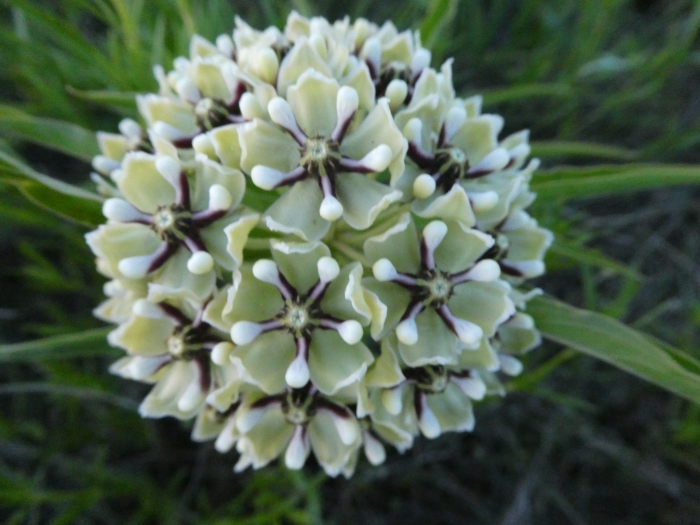Antelopehorns
(Asclepias asperula subsp. capricornu)
Antelopehorns (Asclepias asperula subsp. capricornu)
/
/

Lisa Winnett-Pequeno
CC BY 4.0
Image By:
Lisa Winnett-Pequeno
Recorded By:
Copyright:
CC BY 4.0
Copyright Notice:
Photo by: Lisa Winnett-Pequeno | License Type: CC BY 4.0 | License URL: http://creativecommons.org/licenses/by/4.0/ | Rights Holder: Lisa Winnett-Pequeno | Publisher: iNaturalist | Date Created: 2018-04-28T01:02:14Z |



















































Estimated Native Range
Summary
Asclepias asperula subsp. capricornu, commonly known as Antelopehorns, is a deciduous perennial herb native to open grasslands, prairies, and desert scrub in the Central United States, particularly in Texas and surrounding states. It typically grows to a height of 1-3 feet (0.3-0.9 meters) and a width of 1-2 feet (0.3-0.6 meters). Antelopehorns feature a clumping form with stout, upright stems and narrow leaves that spiral around them. The plant is named for its distinctive horn-like seed pods. It produces clusters of intricate greenish-yellow flowers with purplish centers in the spring and early summer, which are highly attractive to pollinators, especially monarch butterflies.
Antelopehorns is valued for its role in supporting butterfly populations, including being a host plant for monarch caterpillars. It is drought-tolerant, making it an excellent choice for xeriscaping, wildflower gardens, and naturalized areas. Gardeners appreciate its low water requirements and adaptability to poor, well-drained soils. While it thrives in full sun, it can tolerate partial shade. It is not commonly afflicted by diseases or pests, but it can be susceptible to root rot in poorly drained soils. Antelopehorns is not known for aggressive roots or invasiveness, but its milky sap can be toxic if ingested and may irritate skin on contact.CC BY-SA 4.0
Antelopehorns is valued for its role in supporting butterfly populations, including being a host plant for monarch caterpillars. It is drought-tolerant, making it an excellent choice for xeriscaping, wildflower gardens, and naturalized areas. Gardeners appreciate its low water requirements and adaptability to poor, well-drained soils. While it thrives in full sun, it can tolerate partial shade. It is not commonly afflicted by diseases or pests, but it can be susceptible to root rot in poorly drained soils. Antelopehorns is not known for aggressive roots or invasiveness, but its milky sap can be toxic if ingested and may irritate skin on contact.CC BY-SA 4.0
Plant Description
- Plant Type: Herb
- Height: 1-3 feet
- Width: 1-1.5 feet
- Growth Rate: Moderate
- Flower Color: Green
- Flowering Season: Spring, Summer
- Leaf Retention: Deciduous
Growth Requirements
- Sun: Full Sun, Part Shade
- Water: Low, Medium
- Drainage: Fast
Common Uses
Bee Garden, Bird Garden, Butterfly Garden, Deer Resistant, Drought Tolerant, Fragrant, Hummingbird Garden, Low Maintenance
Natural Habitat
Open grasslands, prairies, and desert scrub in the Central United States
Other Names
Common Names: Antelope Horns
Scientific Names: , Asclepias asperula subsp. capricornu, Asclepias capricornu, Asclepiodora decumbens, Asclepias asperula var. decumbens, Asclepias decumbens, Anantherix decumbens, Acerates decumbens, Anantherix angustifolia, Anantherix nuttaliana,
GBIF Accepted Name: Asclepias asperula subsp. capricornu (Woodson) Woodson